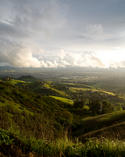Urban Issues
For many locals, Silicon Valley surrendered to the tyranny of development when it lost its last major fruit orchard in 1996. Olson's family cherry orchards, a 100-year player in the valley's agricultural history, shut down its main operations, and Deborah Olson mournfully told a local reporter then, "We're down to 15 acres at this point." There is a happy ending. With community support, the Olson family continues to sell its famous cherries at its fruit stand in Sunnyvale, Calif.
Ultimately, Silicon Valley's history is predicated on a continual progression from industrial to post-industrial. Adding to the chaotic ferment and success, multiple sectors co-exist at different stages of maturity at any given moment. read more »
by Anonymous 11/27/2009
Has evidence-based planning fallen from grace in favour of catchy slogans and untested assumptions? In the case of urban planning, arguably that is just what’s happened. The evidence, in Australia at least, is worrying.
“We must get people out of cars and onto public transport.” “We must stop urban sprawl and the consumption of valuable land.” “We must build higher density communities to achieve sustainable environmental outcomes.” Phrases like this are now de rigueur across many discussions about urban planning in the media, in politics and in regulatory circles in Australia. They are rarely challenged on the basis of what the actual social, economic or scientific evidence is really saying. read more »
If Indian Prime Minister Manmohan Singh wants a taste of home during his visit to Washington this week, he might consider a trip to McLean, Va., home to the region's largest indoor mall, Tysons Corner Center. After all, there are few groups more mall-crazy than India's expanding affluent class.
Back here in the U.S., urban boosters and planners like to predict that malls are "vanishing." But while consumer-deflated America may suffer from mall fatigue and a hangover from overbuilding, much of the developing world has experienced no such malaise. In 2000, for example, India was virtually mall-less. Today it has several hundred, with scores of new ones on the drawing boards. read more »
It's an interesting puzzle. The “cool cities”, the ones that are supposedly doing the best, the ones with the hottest downtowns, the biggest buzz, leading-edge new companies, smart shops, swank restaurants and hip hotels – the ones that are supposed to be magnets for talent – are often among those with the highest levels of net domestic outmigration. New York City, Los Angeles, San Francisco, Boston, Miami and Chicago – all were big losers in the 2000s. Seattle, Denver, and Minneapolis more or less broke even. read more »
I have never lived in New Jersey. Indeed, of the 49 states where I have driven a car, New Jersey was 47th or 48th on the list. And it is only in the last couple of years that I've lived close enough to visit the state regularly – I now live less than an hour from Mahwah.
Years ago, I made some initial hypotheses about the Garden State:
1. New Jersey is extraordinarily wealthy.
2. New Jersey has the best highway system in the country.
3. New Jersey deserves the moniker "The Garden State."
4. New Jersey embodies the American Dream.
Let's see how these have withstood the test of time. read more »
by Anonymous 11/20/2009
During the first ten days of October 2008, the Dow Jones dropped 2,399.47 points, losing trillions of investor equity. The Federal Government pushed TARP, a $700 billion bail-out, through Congress to rescue the beleaguered financial institutions. The collapse of the financial system was likened to an earthquake. In reality, what happened was more like a shift of tectonic plates.
*********************************** read more »
It was during a recent tour of a sun-baked Los Angeles schoolyard that theories on state regulations developed by the latest Nobel Prize-winning economist came into focus. The Da Vinci Design Charter School is an oasis in an asphalt desert. Opened this year by the appropriately named Matt Wunder, the school draws 9th and 10th graders from some of the most difficult and dangerous learning environments in the country, and introduces them to a demanding, creative atmosphere. read more »
To read the periodic house price reports out of California, it would be easy to form the impression that house prices are continuing to decline. Most press reports highlight the fact that house prices are lower this year than they were at the same time last year. This masks the reality of robust house price increases that have been underway for nearly half a year. The state may have forfeited seven years of artificially induced house price escalation in just two years but has recovered about one-fifth of it since March. read more »
People are expecting British house building to pick up. Sadly they will be disappointed, even as the housing market inflates into another bubble.
There have been declines and recoveries in British house building before the 2007 collapse in construction activity. Data is in abundance. The total number of homes built annually has more than halved since the late 1960s, as successive governments withdrew from publicly funding the post-war welfare programme of council house building. read more »
|






















